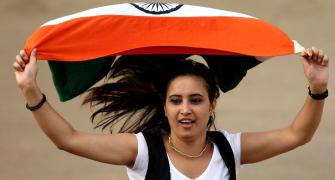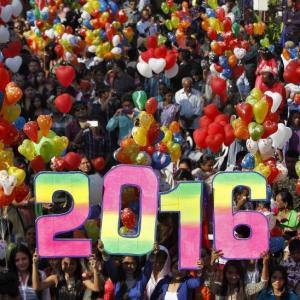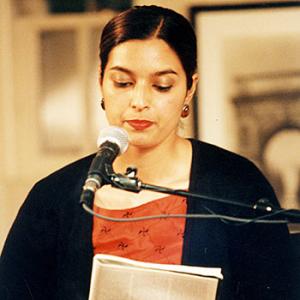'When I woke up on New Year's morning last week, it occurred to me that nobody had bothered to investigate how Christmas and the year end were different in my adopted home town of Bournemouth -- a charming place on the south coast of England -- from what played out on the streets of Pala in Kerala.'
'This was clearly an important omission,' says Chindu Sreedharan, and sets out to correct it.
Illustration: Uttam Ghosh/Rediff.com

In the small south Indian town of Pala where I spent much of my childhood, Christmas and New Year were celebrated to the hilt. All major holidays were. I don't know if things have changed since I left -- let's face it: How much fun can a place really be without me? But the people of Pala certainly knew how to enjoy themselves when I was growing up.
Everybody in Pala loved to drink. Everybody under the age of 80 was a hothead. And everybody carried a knife tucked into the waistband of his mundu, the popular garment men wore instead of trousers, to be unsheathed and brandished with great vigour at the slightest provocation, particularly on festival days after you have had a few.
The knife-waving was mostly an act of machismo, akin to the nightly attempt by hundreds of lads across England to prove their virility by gulping down the hottest Chicken Vindaloo from curry houses after a pub crawl, but it was also the cue for onlookers to joyously join in and beat the shit out of the knife-wielder.
Those who did not have the stomach for close combat watched from the sidelines and made a lot of noise. Some threw bricks, stones, sticks and sometimes shopping. Umbrellas were also used to good effect, and on one glorious occasion on a rainy afternoon, I saw a policeman disarm a knife-wielder with a flamboyant swat of his folded brolly.
Invariably, all this action led to some broken bones and a knifing or two, which was all part of the festivities. The injured were unceremoniously piled into a Mahindra Jeep and driven at breakneck speed, horn blaring, headlights on, bursting at the seams with good Samaritans, to the Kottayam Medical College 15 miles away, by someone who has had a few.
These makeshift ambulances reached their destination surprisingly often, and the Samaritans hung around outside while the injured were treated or were pronounced dead. It was all very communal and jolly in a rather bloody sort of way.
I bring all this up now because when I woke up on New Year's morning last week, it occurred to me that nobody had bothered to investigate how Christmas and the year end were different in my adopted home town of Bournemouth -- a charming place on the south coast of England -- from what played out on the streets of Pala. This was clearly an important omission.
Did the good people of Bournemouth start the day with an alcoholic beverage like my townsmen did in Pala?
Did they engage in a robust bout of street brawling before they went home to their turkey lunches?
Did New Year celebrations include a visit to the emergency room with a stab wound or two?
These were important cultural questions readers all over the world were asking and it was time someone made an honest effort to answer them.
One thing you quickly realise when you move to England is that the English live for their holidays. They really do. This is particularly true of those in Bournemouth, who, owing to their status in a coastal town that sees holidaymakers round the year, are permanently poised to slip into some wholesome holidaymaking themselves.
No sooner has the week begun will you hear colleagues heaving deep sighs. If you look up at this point, they will put on a brave face and blow out air through pursed lips to signal what a hard week they are having.
"Can't wait for the weekend," one will say.
"Quite," another will say gloomily. "Dreadful week."
There will be silence for a few seconds. Then someone will say, usually in a voice high in pitch, "Four more days till Friday!"
This will immediately cheer up the group. The briefest of smiles will flicker across all faces, and everyone in the room will begin a mental list of the things they have to get done on the weekend.
Now if that's the eagerness with which weekends are greeted, you can imagine the excitement that precedes major holidays. Holiday fever begins early in England. Really early. I mean, really, really early. Now you have to remember that this is a nation of planners, where everything from breakfast to mini-breaks are planned out to within an inch of their lives, so you can imagine the effort that goes into organising something big like Christmas and New Year celebration.
Christmas preparations usually start immediately after the New Year. At the very latest, plans will be in place by Easter. By the end of October, immediately after Halloween, my friends here will work themselves into a state. Hours will be spend on creating colourful lists (the English love their lists). Hours on frantic weekend shopping, hours sneakily wrapping up little presents and cute cards for everyone they have come in contact with in the last 20 years.
It's important that no one -- and I mean no one -- is left out.
One of my foreign friends, exasperated at her English mother-in-law's charming habit of buying gifts for all and sundry told me once, "Why does she have to give gifts to everyone? Her room is like an elf's workshop -- gifts and cards and wrappings everywhere! You can't go in there for weeks!"
This was not how we rolled in Pala when I was growing up. We didn't muck around much with planning. I don't think my parents ever sat down and went, "Right, what are we doing for Christmas?"
Now I appreciate they were supposedly Hindus and things might have been different in the homes of my Christian friends, who had cribs to build, decorations to put up, and cakes to bake.
There was also the little matter of the main meal itself -- appam, chicken stew, duck mappas and a few other dishes I cannot mention without drooling all over my laptop -- and I suppose it took some preparation.
But we didn't prep in the same painstaking way the English did. If nothing else, we were the children of spontaneity. So we winged it, including when it came to the customary hospital visits in the back of the Mahindra Jeep, and in the end, if you were willing to be a little philosophical about life, it all worked out just fine.
All this, I suspect, has given you the impression that Pala and Bournemouth are far too culturally distant, far too foreign, to make for a meaningful comparison. This is where you are wrong.
Allow me to explain by presenting a most telling statistic, the one indicator that all sensible people around the world consider the ultimate mark of culture and civilisation.
I am, of course, talking about per capita alcohol consumption and this is where the people of Pala and Bournemouth stumble united.
You will remember I hinted that Pala had a healthy fondness for drinks.
What I had omitted to say was that in this particular league, it pretty much tops the national charts. Pala belongs to Kerala, the Indian state widely reported to have the largest per capita consumption of alcohol. Personally I believe my town is one of the pillars on which the state has built this awesome reputation.
Now consider Bournemouth. It is no lightweight in this department either, being the sixth worst place in England so far as alcohol fatalities are concerned. This is according to a study released by the Public Health of England, which also places the town as the second worst in terms of under-18 alcohol-specific hospital admissions.
I don't have the comparative figures for Pala at hand -- like I said before, over there we live in the moment -- but you can see that that places both towns in the same ballpark.
If that's not enough, here's a clincher: Both towns are believed to drink well above the global average of 6.2 litres of pure alcohol per year. If you extrapolate from regional and national statistics, you will see that Pala consumes somewhere between eight and nine litres of alcohol per person (perhaps more: Accurate stats are not available because we don't drink and tell), while Bournemouth gulps down -- hold your breath -- a whopping 11.6 litres per person.
It doesn't stop there. Like some of my good friends do in Pala, the average family in Bournemouth -- I am going by the national statistics here, as per a survey by Travelodge and published in the unimpeachable Mirror -- downs the first festive drink pretty early: On Christmas Day, at 9.05 am. By 9.30 they have had their first blow-up and the day is all set for a series of similar events.
Admittedly, there isn't too much knife-waving involved and the English by and large seem to keep their quarrels off the streets on Christmas and New Year (I say this with utter confidence because an online search throws up only two knifings: One on New Year, wherein a 25 year old died in Bournemouth, and another on Christmas Day in some other town last year, which the culprit maintains was 'accidental'), but what you must note here is the same appetite for alcohol-laced altercations and general stupidity that overcome my friends in Pala on similar occasions.
If all this does not indicate a kinship of the most telling kind, the strongest bond of all brotherhoods, I don't know what does.
Which brings me to the crux of this column. I think we should seriously consider twinning Bournemouth with Pala. It's not right to keep our people apart.
Before Chindu Sreedharan migrated to England to teach journalism at Bournemouth University, he was a very special journalist at Rediff.com
He is the author of Epic Retold.










